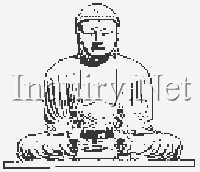Buddhism is the fourth largest religion in the world. About 360 million people in the world are Buddhists. Most of these are in Asia, however there are more than one million Buddhists in the United States.
Origins of Buddhism
Buddhism was founded in northern India by Siddhartha Gautama. He was born
about 563 BCE in modern-day Nepal. He was a prince but at the age of 29, he left
his wife, children and his princely luxury in order to seek truth. In 535 BCE,
he attained enlightenment and assumed the title Buddha (one who has awakened).
He had many disciples and accumulated a large public following by the time of
his death in 483 BCE. Two and a half centuries later, a council of Buddhist
monks collected his teachings and the oral traditions of the faith into written
form, called the Tripitaka. This included a large collection of commentaries and
traditions called Sutras.
Gautama. He was born
about 563 BCE in modern-day Nepal. He was a prince but at the age of 29, he left
his wife, children and his princely luxury in order to seek truth. In 535 BCE,
he attained enlightenment and assumed the title Buddha (one who has awakened).
He had many disciples and accumulated a large public following by the time of
his death in 483 BCE. Two and a half centuries later, a council of Buddhist
monks collected his teachings and the oral traditions of the faith into written
form, called the Tripitaka. This included a large collection of commentaries and
traditions called Sutras.
After the Buddha's death, splits occurred and today there are three main forms of Buddhism. Therevada Buddhism has 100 million followers, mainly in Burma, Cambodia, Laos, Sri Lanka, Thailand, and Vietnam. Mahayana Buddhism is the dominant religion in China, Japan, and Korea. Tantric Buddhism has perhaps 10 million adherents in Tibet, Mongolia, China, and Russia.
Buddhist Sacred Texts
The teachings of Buddha and his early disciples are contained in the 29 books of the Ti-pitaka. Most of the Ti-pitaka dates back to the second and third centuries BCE. Each of the three forms of Buddhism has other sacred texts as well.
Buddhist Beliefs
Buddhism is not a single, unified religion. Many adherents have combined the
teachings of the Buddha with their local religious customs. Buddhism at its core
is a philosophical system.
combined the
teachings of the Buddha with their local religious customs. Buddhism at its core
is a philosophical system.
Buddhism shares few concepts with Christianity. For example, Buddhists do not believe in a God or Gods, or the need for a personal savior. Buddhists do not believe in the power of prayer, eternal life in a heaven or hell after death. They do believe in reincarnation. All persons go through many cycles of birth, living, and death. After many such cycles, if a person releases their attachment to the self, they can attain Nirvana. The Buddha's Eightfold Path consists of: right understanding, right thinking, right speech, right conduct, right livelihood, right effort, right mindfulness, and right concentration.
Many Buddhists believe in Karma. This is the balance of one's accumulated sin and merit, which will determine the nature of the next life to come.